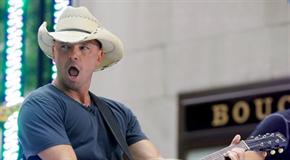Features
Chesney’s Business Advice
The New York Times’ Adam Bryant recently interviewed Chesney not as a country star but as an employer of 120 people while on the road. Not only were the questions good, Chesney’s answers merit some attention.

Chesney came to the realization that he was ultimately the person paying his road crew and he was the one responsible for making sure everyone arrives at the next show on time. He also said that he sat down with his manager, Dale Morris, a long time ago and figured out how to make sure he wasn’t just breaking even every year.
And, as the CEO of Kenny Chesney Inc., the performer wanted to make sure everyone understood that no job was more important than another.
“I want all the people out there who work with me to feel as appreciated as possible, especially the people who are first to get up in the morning and the last to go to bed,” he told the Times. And one of the ways is the occasional “merch lottery,” where they put names into a sombrero, and one person gets the merch sales for the night. He said the biggest check was $300,000.
“But you know what those guys did?” Chesney asked. “They waited until the end of the year and I wrote one big check to the crew and they divided it up 13 ways. Doing things like that just motivates people.”
Also, at the end of the year, Chesney takes his band, crew, merch people, caterers, management team and their significant others to the Virgin Islands for a week.
When it comes to hiring, even new musicians, he tries to find out if the employee is as good a person as a player.
“That’s because when you live with people out there, and you have as big a family as we have, attitude is so contagious,” he told Bryant. “You take a couple of people who have hidden agendas or bad attitudes or feel entitled or whatever the negativity is, and it just spreads like a cancer.”

He asks interviewees about their family, what they do on their downtime, and if they watch television. But he never asks about politics or religion. “I have to know if, deep down, they’re a solid person, and that they’re not on drugs and don’t have those kind of problems.
“And are they dependable? I mean, that’s the main thing.”
Another important quality for a road crewmember, he noted, is being able to take situations in stride and not make them seem like life-or-death issues.
Click here for the entire article in the New York Times and here for Kenny Chesney’s official website.